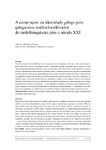Mostrar o rexistro simple do ítem
A construçom da identidade galega polo galeguismo institucional(izado): do tardofranquismo para o século XXI
| dc.contributor.author | Martínez Tejero, Cristina | es_ES |
| dc.date.accessioned | 2014-10-02T12:18:13Z | |
| dc.date.available | 2014-10-02T12:18:13Z | |
| dc.date.issued | 2012 | es_ES |
| dc.identifier.citation | Novas achegas ao estudo da cultura galega II. Enfoques socio-históricos e lingüístico-literarios; 2012: 253-265. ISBN: 978-84-9749-517-2 | es_ES |
| dc.identifier.isbn | 978-84-9749-517-2 | es_ES |
| dc.identifier.uri | http://hdl.handle.net/2183/13234 | |
| dc.description.abstract | [Resumo] Partindo do quadro do tardofranquismo como período de mudanças, o objectivo desta comunicaçom é aprofundar nas diversas concepçons sobre a identidade galega colocadas polos colectivos mais institucionalizados em jogo dentro do campo cultural entre o fim dos anos 60 e os inícios dos 70. Concretamente, centraremos a nossa atençom nas ideias sobre a identidade diferenciada da Galiza (re)elaboradas e promovidas por estes grupos, principalmente polo reunido em torno à editorial Galaxia e polo formado por agentes vinculados às instituiçons culturais oficiais do regime franquista. Para isto, focaremos, em primeiro lugar, a estrutura institucional que apresenta o sistema cultural galego da altura, com especial atençom à Real Academia Gallega. Estableceremos, também, as principais linhas de actuaçom privilegiadas polas duas correntes em oposiçom —a encaminhada a constituir um sistema cultural galego relativamente autónomo e aquela que pretende integrar-se dentro do sistema espanhol— e, finalmente, procuraremos as convergências e divergências com as tendências institucionais promovidas no momento actual. | es_ES |
| dc.description.abstract | [Abstract] The principal aim of this paper is to identify and analyse the different conceptions of Galician identity held by the most institutionalised groups of the cultural field during the period of the late 1960s and early 1970s within the framework of the last years of the Franco regime, a period of change. In particular, we focus on the ideas about a separate Galician identity as (re)developed and promoted by these institutional groups, especially by a group related to the publishing house Galaxia and another group linked to the cultural institutions of the Franco regime. To this effect, firstly we look at the institutional structure of the Galician cultural system at that time, with special attention to the Real Academia Gallega. We also determine the main strategies privileged by two opposite movements — one aimed at establishing a Galician cultural system with a certain degree of autonomy and another trying to integrate it into the Spanish cultural system. Finally, we look for coincidences and differences in relation with the institutional tendencies currently promoted. | es_ES |
| dc.language.iso | glg | es_ES |
| dc.publisher | Universidade da Coruña | es_ES |
| dc.subject | Sistema cultural galego | es_ES |
| dc.subject | Instituiçons culturais | es_ES |
| dc.subject | Real Academia Galega | es_ES |
| dc.subject | Construço da identidade | es_ES |
| dc.subject | Tardofranquismo | es_ES |
| dc.subject | Galician cultural system | es_ES |
| dc.subject | Cultural institutions | es_ES |
| dc.subject | Construction of identity | es_ES |
| dc.subject | Late Franco regime | es_ES |
| dc.title | A construçom da identidade galega polo galeguismo institucional(izado): do tardofranquismo para o século XXI | es_ES |
| dc.type | info:eu-repo/semantics/conferenceObject | es_ES |
| dc.rights.access | info:eu-repo/semantics/openAccess | es_ES |






